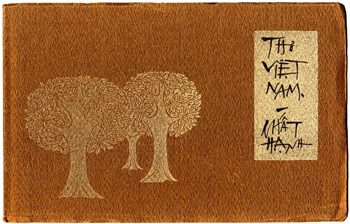Recently, our staff has been revisiting modernizations of canonical works. Our editors recommend their latest favorite reads from Vietnam and Japan, including a collection of poems meditating on the Vietnam War and a Japanese essay on aesthetics. Sign up for our newsletter to get these recommendations delivered right to your inbox.

In May of 1966, Thích Nhất Hạnh, 39 years old and not yet famous, arrived in Nyack, New York, at the invitation of the Fellowship of Reconciliation (FOR)—an American peace organization—to lecture on the escalating Vietnam crisis. He then traveled to Washington, D.C., and throughout the continental U.S., to present a Buddhist-led peace proposal that called for a cease-fire with the North Vietnamese government, followed by humanitarian assistance from the U.S. toward a peaceful reconstruction of Vietnam. Thích Nhất Hạnh’s 1966 peace tour included readings of his folk poetry, which he also translated into English, to portray the raw feelings of Vietnamese who “[could not] speak for themselves; [did not] know or care much about words like communism or democracy but [wanted] above all for the war to end….” The poems were subsequently published in a chapbook entitled Thơ Việt Nam (Vietnamese Poetry), by Unicorn Press, Santa Barbara, California. Three of them, “Condemnation”, “Our Green Garden”, and “Peace”, also appeared in the June 9, 1966 issue of the New York Review of Books. Visceral and intimate, Thích Nhất Hạnh’s poems define the Vietnam War as a civil war. Beyond the Cold War context, all warring nations are seen as misguided brothers. Thích Nhất Hạnh’s peace sojourn was denounced by his brethren on both sides of the Vietnam conflict and turned what he thought was a three-month journey into a 40-year exile. He was eventually allowed to return to Vietnam and passed away on January 22, 2022, a month before Russia invaded Ukraine.
–Thuy Dinh, Editor-at-Large for the Vietnamese Diaspora READ MORE…

